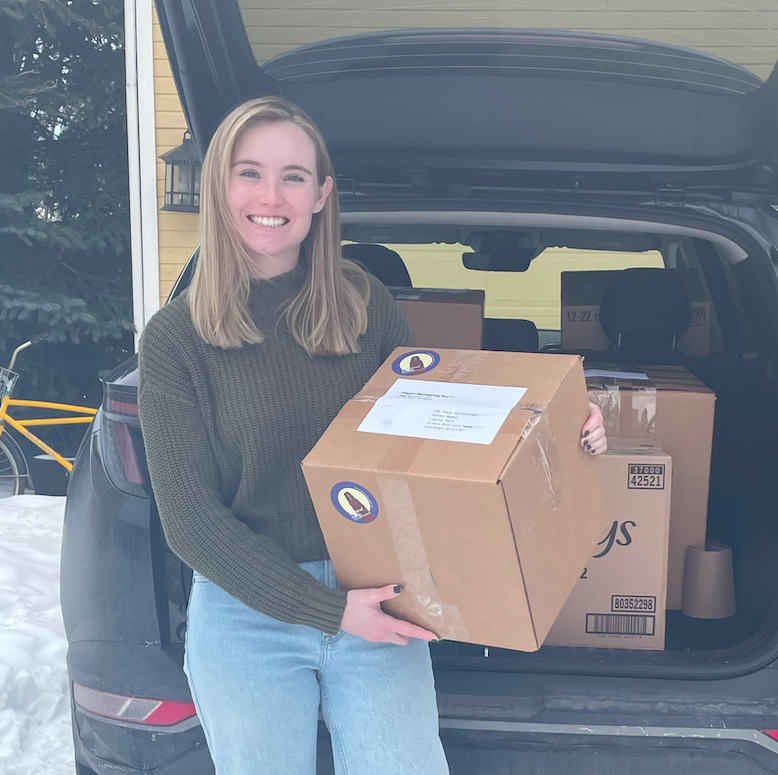What started as a way for Mackenzie Boyd ’24 and her family to give back has blossomed into a mission to end period poverty, with support from college students around the country.
“Period poverty is a worldwide epidemic that does not often get discussed,” Boyd says. “Although it is defined as a lack of access to menstrual products, hygiene facilities, waste management, and education, it is this lack of supplies that affects many people globally, causing physical, mental, and emotional challenges.”
In 2019, Boyd and her mom founded a youth program that brought together Colorado high school students and students from reservations in the west to discuss their shared similarities and differences.
“It was during a break-out session discussing women's issues that I was facilitating that the subject of menstruation came up. I was surprised to learn that because students could not afford period products, they would have to skip school when they were on their periods. I had thought that food stamps provided the opportunity to purchase menstrual products, but I was very much mistaken. There are no federal or state programs that provide menstrual products for free, and that is why nonprofits like mine are so important,” Boyd says.
Boyd founded Project: Distributing Dignity during her junior year at Castle View High School in Castle Rock, CO. As part of the project, Boyd collects and packages menstrual products to send to students on local reservations.
“I was really upset that students had to miss school because of a normal bodily function. Why should they be punished just for having a uterus? It is a human right to obtain an education. I knew I needed to do something, and that is how Project: Distributing Dignity was born. Our motto is that a period should never be a barrier to an education,” says Boyd.
Now at CC, Boyd, a geology major and 2020 Boettcher Scholar, continues to grow the project. What started with sending menstrual products to the Pine Ridge Reservation has expanded to distributing products to more reservations, including the Rosebud Reservation. In March, Boyd’s project was short on time, so she and about 15 other Boettcher Scholars quickly worked to pack products. Boyd’s mom drove down that night to collect the bags and she shipped them out the next day.
“It was over 14 boxes of products! I was so impressed with how quickly this process went. We stuffed over 3,500 pads into 320 bags in just a couple of hours. Many hands indeed make light work,” says Boyd.
“I find this project so important because, as a student from a rural area that grew up on and near the Southern Ute Reservation in southwest Colorado, I’ve seen firsthand the socioeconomic disparity that resource deserts create and perpetuate,” says Royce Hinojosa ’26, a philosophy and business, economics, and society double major who assisted with packaging the menstrual products in March. “Distributing Dignity brings to light the importance of helping students from all areas and makes visible issues that aren’t adequately represented.”
Boyd and her project are making a difference. “We were told by the nurse at one of the schools we work with that 90% of students who used to miss school each month due to period poverty are now coming to school consistently,” she says.
“Students do not attend school due to a lack of products,” says Boyd. “This is world-wide, and period poverty impacts individuals wherever there are people experiencing poverty. But on the reservations, such high rate of unemployment rates due to lack of access to jobs causes the highest poverty rate in the country. Families have to decide between food, heat, and period supplies.”
Students from the University of Northern Colorado, Auburn University, Oglala Lakota College, and Embry–Riddle Aeronautical University are also involved in the project. Additionally, several high school students in Colorado are working to get involved.
Always, Procter and Gamble, and Walmart recently named Project: Distributing Dignity one of the 50 period heroes in 50 states.
Project: Distributing Dignity was formalized as a 501-c3 nonprofit in January 2020.
Readers can learn more about Project: Distributing Dignity and how to get involved on the website and Instagram.






